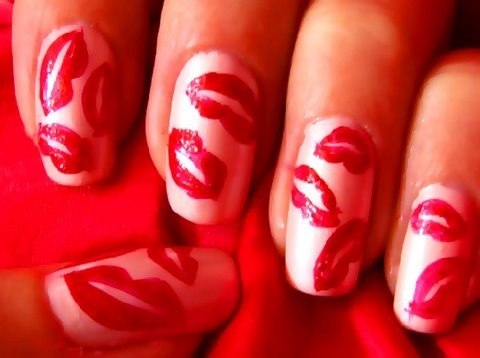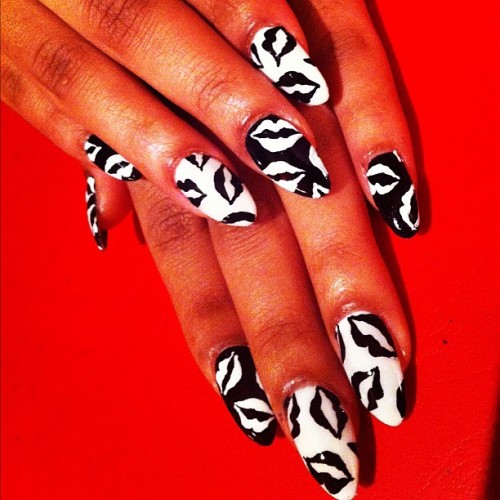Nail Polish Design Biography
(Source google.com)
Nail polish originated in China, and its
use dates back to 3000 BC. Around 600 BC, during the Zhou Dynasty, the royal
house preferred the colors gold and silver. However, red and black eventually
replaced these metallic colors as royal favorites. During the Ming Dynasty,
nail polish was often made from a mixture that included beeswax, egg whites,
gelatin, vegetable dyes, and gum Arabic.In Egypt, the lower classes wore pale
colors, whereas high society painted their nails red. By the turn of the 9th century,
nails were tinted with scented red oils, and polished or buffed. In the 19th
and early 20th centuries, people pursued a polished rather than a painted look
by massaging tinted powders and creams into their nails, then buffing them
shiny. One such polishing product sold around this time was Graf's Hyglo nail
polish paste.
After the creation of automobile paint, Cutex produced the first modern nail polish in 1917. In 1932, the Charles Revson Company (later Revlon) produced their first nail polish. Once nail polish was refined, it was often used in the place of gloves to cover up the grime underneath finger and toe nails. Nail polish is a characterized by natural pink base nails with white tips, making it one of the first popular and well known color schemes with nail polish. The tips of the nails are painted white while the rest of the nails are polished in a pink or a suitable nude shade. French manicures may have originated in 18th-century Paris and were popular in the 1920s and 1930s. Social media has given rise to the nail art culture that allows users to share their pictures about their nail art. "WWD reports nail polish sales hit a record $768 million in the U.S. in 2012, a 32% gain over 2011, despite a cluttered market that seemingly sees a new launch each week." Several new polishes and related products came on to the market in the second decade of the 21st century as part of the explosion of nail art, such as nail lacquer that can be applied to the human fingers or toe nails to decorate and protect the nail plate. The formulation has been revised repeatedly to enhance its decorative effects and to suppress cracking or flaking. Nail polish consists of an organic polymer with various additives. Traditionally, nail polish started in clear, red, pink, purple, and black. Since that time, many new colors and techniques have developed, resulting in nail polish that can be found in an extremely diverse variety of colors. Beyond solid colors, nail polish has also developed an array of other designs and colors, such as nail polish stamps, crackled, magnetic, nail polish strips and stickers; fake rhinestones are also often applied. Some types of polish are advertised to cause nail growth, make nails stronger, prevent nails from breaking, cracking and splitting, and to stop nail biting. Nail polish may be applied as one of several components in a manicure.
After the creation of automobile paint, Cutex produced the first modern nail polish in 1917. In 1932, the Charles Revson Company (later Revlon) produced their first nail polish. Once nail polish was refined, it was often used in the place of gloves to cover up the grime underneath finger and toe nails. Nail polish is a characterized by natural pink base nails with white tips, making it one of the first popular and well known color schemes with nail polish. The tips of the nails are painted white while the rest of the nails are polished in a pink or a suitable nude shade. French manicures may have originated in 18th-century Paris and were popular in the 1920s and 1930s. Social media has given rise to the nail art culture that allows users to share their pictures about their nail art. "WWD reports nail polish sales hit a record $768 million in the U.S. in 2012, a 32% gain over 2011, despite a cluttered market that seemingly sees a new launch each week." Several new polishes and related products came on to the market in the second decade of the 21st century as part of the explosion of nail art, such as nail lacquer that can be applied to the human fingers or toe nails to decorate and protect the nail plate. The formulation has been revised repeatedly to enhance its decorative effects and to suppress cracking or flaking. Nail polish consists of an organic polymer with various additives. Traditionally, nail polish started in clear, red, pink, purple, and black. Since that time, many new colors and techniques have developed, resulting in nail polish that can be found in an extremely diverse variety of colors. Beyond solid colors, nail polish has also developed an array of other designs and colors, such as nail polish stamps, crackled, magnetic, nail polish strips and stickers; fake rhinestones are also often applied. Some types of polish are advertised to cause nail growth, make nails stronger, prevent nails from breaking, cracking and splitting, and to stop nail biting. Nail polish may be applied as one of several components in a manicure.
French manicures are manicures
designed to resemble natural nails, and are characterized by natural pink base
nails with white tips, making it one of the first popular and well known color
schemes with nail polish. The tips of the nails are painted white while the
rest of the nails are polished in a pink or a suitable nude shade. French
manicures may have originated in 18th-century Paris and were popular in the 1920s and
1930s. Social media has given rise to
the nail art culture that allows users to share their pictures about their nail
art. "WWD reports nail polish sales hit a record $768 million in the U.S. in 2012, a
32% gain over 2011, despite a cluttered market that seemingly sees a new launch
each week." Several new polishes and related products came on to the
market in the second decade of the 21st century as part of the explosion of
nail art, such as nail stickers (either made of nail polish or plastic),
"crackle" nail polish, magnetic nail polish, nail polish marketed for
men, and nail decorations.
Nail Polish Design Nail Designs 2014 Tumblr Step By Step For Short Nails With Rhinestones With Bows Tumblr Acrylic Summber Ideas
Nail Polish Design Nail Designs 2014 Tumblr Step By Step For Short Nails With Rhinestones With Bows Tumblr Acrylic Summber Ideas
Nail Polish Design Nail Designs 2014 Tumblr Step By Step For Short Nails With Rhinestones With Bows Tumblr Acrylic Summber Ideas
Nail Polish Design Nail Designs 2014 Tumblr Step By Step For Short Nails With Rhinestones With Bows Tumblr Acrylic Summber Ideas
Nail Polish Design Nail Designs 2014 Tumblr Step By Step For Short Nails With Rhinestones With Bows Tumblr Acrylic Summber Ideas
Nail Polish Design Nail Designs 2014 Tumblr Step By Step For Short Nails With Rhinestones With Bows Tumblr Acrylic Summber Ideas
Nail Polish Design Nail Designs 2014 Tumblr Step By Step For Short Nails With Rhinestones With Bows Tumblr Acrylic Summber Ideas
Nail Polish Design Nail Designs 2014 Tumblr Step By Step For Short Nails With Rhinestones With Bows Tumblr Acrylic Summber Ideas
Nail Polish Design Nail Designs 2014 Tumblr Step By Step For Short Nails With Rhinestones With Bows Tumblr Acrylic Summber Ideas
Nail Polish Design Nail Designs 2014 Tumblr Step By Step For Short Nails With Rhinestones With Bows Tumblr Acrylic Summber Ideas
Nail Polish Design Nail Designs 2014 Tumblr Step By Step For Short Nails With Rhinestones With Bows Tumblr Acrylic Summber Ideas
Nail Polish Design Nail Designs 2014 Tumblr Step By Step For Short Nails With Rhinestones With Bows Tumblr Acrylic Summber Ideas
Nail Polish Design Nail Designs 2014 Tumblr Step By Step For Short Nails With Rhinestones With Bows Tumblr Acrylic Summber Ideas
Nail Polish Design Nail Designs 2014 Tumblr Step By Step For Short Nails With Rhinestones With Bows Tumblr Acrylic Summber Ideas












No comments:
Post a Comment